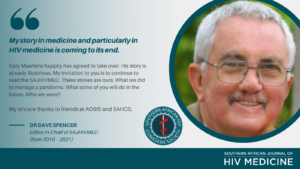The Southern African Journal of HIV Medicine gives thanks to outgoing Editor-in-Chief
The Southern African Journal of HIV Medicine (SAJHIVMED) and AOSIS would like to thank the outgoing Editor-in-Chief, Dr David Spencer, for his tenure at the journal’s helm.
Dr Spencer is a South African Infectious Diseases clinician and has assisted the Southern African Clinicians’ Society (SAHCS) as the Editor-in-Chief of the Southern African Journal of HIV Medicine since 2019. During his tenure as Editor-in-Chief of the journal, he has undoubtedly made a significant impact in the success and quality of the published work in the medical field of HIV Medicine.
He was born in South Africa in 1950 and completed undergraduate training in medicine at the University of Cape Town, 1969-1974. He later trained in Internal Medicine and Oncology at the University of the Witwatersrand, Johannesburg. From 1988-to 1990, he trained in Infectious Diseases with Emanuel Wolinsky at Case Western Reserve University in Cleveland, USA.
Over the 45 years that Dr Spencer has practiced medicine in South Africa, has worked in rural hospitals, Mseleni Hospital, KwaZulu Natal; in private practice in Johannesburg; and in recent years returned to the academic world of Wits University and several NGOs active in the care of those living with HIV. In 2004 he published ‘The Clinical Practice of HIV Medicine. A practical guide to the care of the HIV infected’, one of the first of its kind on the African continent. Dr Spencer has published extensively in the field of HIV medicine and has been the principal investigator of many early studies in antiretroviral treatment. He was a founding member of SAHCS and on its executive for the first decade of its existence. Dr Spencer regards the greatest gift of medicine to be that of the care of the sick and the alleviation of human suffering.
Exclusively from the desk of Dr David Spencer (Editor-in-Chief of SAJHIVMED from 2019 – 2021)
Time to Change.
“In the last analysis, I have always believed it is not so much their subjects that the great teachers teach as it is themselves. In some box in the attic, or up over the garage, I must have notes on the lectures I heard given by Niebuhr, Tillich and the rest of them. But though most of what these teachers said remains with me still, it is they themselves who left the deeper mark.” (Frederich Buechner. Now and Then. A Memoir of Vocation. Pg 12.)
Science journals tell stories. The stories we tell in the SAJHIVMED are almost all about HIV and the way it effects the lives of people living in southern Africa. The stories are true.
My background has been clinical medicine. In the 1980s I specialized in Oncology-Haematology at the University of the Witwatersrand (Wits), Johannesburg, but later switched to Infectious Diseases. Since 1988, I have worked with people living with HIV (PLHIV) – initially in the USA where I trained, but from 1990, in the public and private sectors of South Africa. Those early years were about diagnosis and treatment: keeping people alive. Multinational studies proved the importance of science to the clinician and to those living with HIV. Where would we be without those ground-breaking randomized clinical trials (RCTs)? After retiring from clinical practice in 2018, I was asked to edit the SAJHIVMED. The adjustment was not easy. All my resignation letters that first year ended in the bin. The staff at AOSIS, the journal’s publishers, were kind. The CEO of the Southern African HIV Clinicians Society, Dr Lauren Jankelowitz, drew on her best counselling skills. I stayed on.
What has been achieved from 2019-2021? We’ve published multiple ‘bread-and-butter’ guidelines: crytptococcal disease (2019), Palliative Care (2019), the Prevention of Mother-to-Child Transmission (2020), Pre-exposure Prophylaxis (2020) and the 2020 Antiretroviral Therapy update. Among these we included several surprises, the Solid-Organ Transplantation (2020) and the Gender-affirming healthcare guidelines (2021)! In 2021 we produced a ‘Special Collection’ that asks whether Africa will get to zero new HIV infections by 2030. Its essential reading for those committed to HIV medicine.
My story in medicine and particularly in HIV medicine is coming to its end. Gary Maartens happily has agreed to take over. His story is already illustrious. My invitation to you is to continue to read the SAJHIVMED. These stories are ours. What we did to manage a pandemic. What some of you will do in the future. Who we were?
My sincere thanks to friends at AOSIS and SAHCS.
David Spencer, Editor of the SAJHIVMED, 2019-2021.
We want to thank Dr Spencer for his hard work and dedication in making a notable impact on the success of this scholarly publication, and we are delighted to have Prof Gary Maartens gradually step into the role of Editor-In-Chief during 2022 and know that he will continue to take SAJHIVMED upwards.

